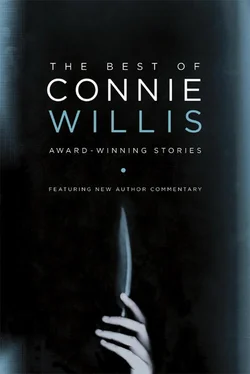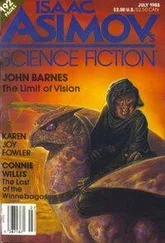The train pulled in. Right on time, shining chrome and plastic, no gum on the floor, no unknown substances on the orange plush seats.
“I beg your pardon,” the woman next to me said, shifting her shopping bag so I could sit down.
Even the people who rode the Tube were more polite than people on any other subway. And better read. The man opposite me was reading Dickens’s Bleak House .
The train slowed. “Regent’s Park,” the flat voice announced.
Regent’s Park. The last time we were here, the Old Man had shouted “To the head!” and vaulted off the train at this station.
He had been taking us on a riotous tour of Sir Thomas More’s body. We had gone to the Tower of London to see the Crown Jewels, and Cath, reading her Frommer’s England on $40 a Day while we stood in line, had said, “Sir Thomas More is buried in the church here. You know, A Man for All Seasons ,” and we had all trooped over to see his grave.
“Want to see the rest of him?” the Old Man had said.
“The rest of him?” Sara had asked.
“Only his body’s buried there,” the Old Man had said. “You need to see his head!” and had led us off to London Bridge, where More’s head had been stuck on a pike, and the Chelsea garden, where his daughter Margaret had buried it after she took it down, and then off to Canterbury, with the Old Man turned around and talking to us as he drove, to the small church where the head was buried now.
“Thomas More’s Remains: The World Tour,” he had said, driving us back at breakneck speed.
“Except for Lake Havasu,” Elliott had said. “Isn’t that where the original London Bridge is?” And when the annual conference was in San Diego, the Old Man had roared up in a rental car and hijacked us all on an overnight jaunt to Arizona to see it.
I couldn’t wait to see him. There was no telling what wild sightseeing he had in mind this time. This was, after all, the man who had gotten us thrown out of Alcatraz.
He hadn’t been at the last four conferences—he’d been off in Nepal for the first one and finishing a book the last three—and I was eager to hear what he’d been up to.
“Oxford Circus,” the flat voice said. Two more stops to Charing Cross.
I leaned out to look at the station as we stopped. Each station has its own distinctive design, its own identifying color: St. Pancras green edged with navy, Euston Square black and orange, Bond Street red. Oxford Circus had a blue chutes and ladders design that was new since the first time we’d been here.
The train pulled out, picked up speed. I would be there in five minutes and to the Adelphi in ten, a lot faster than Cath in her taxi, and at least as comfortable.
I was there in eight, up the escalators and out in the rain, up the Strand to the Adelphi in twenty. It would have been fifteen, but I had to wait ten (huddled under an awning and wishing I’d taken Cath’s advice about an umbrella) to cross the Strand. Black London taxis, bumper to bumper, and double-decker buses, and minis, all going nowhere fast.
Ragtime was sold out. I got a theater map from the rack in the lobby and looked to see where the Duke of York was. It was over on Shaftesbury, with the nearest tube stop Leicester Square. I went back to Charing Cross, and went down the escalator and into the passage that led to the Northern Line. I still had half an hour, which would be cutting it close, but not impossible.
I started down the left-hand tunnel toward the trains, keeping pace with the crowd, straining to hear the rumble of a train pulling in over the muffled din of voices, the crisp clatter of high heels.
People began to walk faster. The high heels beat a quicker tattoo. I got the tube map out of my back pocket. I could take the Piccadilly Line to South Kensington and change to the District and—
The wind hit me like the blast from an explosion. I reeled back, nearly losing my balance. My head snapped back sharply like I’d been punched in the jaw. I groped wildly for the tiled wall.
The IRA’s blown up a train! I thought.
But there was no sound accompanying the sudden blast of searing air, only a dank, horrible smell.
Sarin gas, I thought, and reflexively put my hand over my nose and mouth, but I could still smell it. Sulfur and a wet earthy smell, and something else. Gunpowder? Dynamite? I sniffed at the air, trying to identify it.
But whatever it was, it was already over. The wind had stopped as abruptly as it had hit me, and so had the smell. Not even a trace of it lingered in the dry, stuffy air.
And it must not have been an explosion, or poison gas, because no one else had even slackened their steps. The sound of high heels retained its brisk, even clatter down the tiled passage. Two German teenagers with backpacks hurried past, giggling, and a businessman in a gray topcoat, the Times tucked under his arm, and a young woman in floppy sandals, all of them oblivious.
Hadn’t any of them felt it? Or was it a usual occurrence in Charing Cross Station and they were used to it?
How could anybody possibly get used to a blast like that? They must not have felt it.
Had I felt it?
It was like an earthquake back home in California, a jolt, and then before you could even register it, it was over, and you weren’t sure it had really happened. The only way you could tell for sure was by asking Cath or the kids, “Did you feel that?” or by the picture tilted on the wall.
The only pictures on the walls down here were pasted on, and the German students, the businessman, had already told me the answer to “Did you feel that?”
But I did feel it, I thought, and tried to reconstruct it.
Heat, and the sharp tang of sulfur and wet dirt. But that wasn’t what had made me lose my balance, what had sent me staggering against the wall. It was the smell of panic and of people screaming, of a bomb going off.
But it couldn’t be a bomb. The IRA was in peace negotiations with the British, there hadn’t been an incident for over a year, and bombs didn’t stop in mid-blast. There had been bombs in the Tube before—the mechanical voice would be saying, “Please exit up the escalator immediately,” not “Mind the gap.”
But if it wasn’t a bomb, what was it? And where had it come from? I looked up at the roof of the passage, but there wasn’t a grate or a vent, no water pipes running along the ceiling. I walked along the tunnel, sniffing the air, but there were only the usual smells—dust and damp wool and cigarette smoke, and, where the passage went up a short flight of stairs, a strong smell of oil.
A train rumbled in somewhere down the passage. The train. There had been one pulling in when it hit. It must be causing the wind somehow. I went out onto the platform and stood there looking down the tunnel, half-hoping, half-dreading it would happen again.
The train pulled in and stopped, and a handful of people got off. “Mind the gap!” the computerized voice said. The doors whooshed shut, and the train pulled out. A wind picked up the scraps of paper on the track and whirled them into the side walls, and I braced myself, my feet apart, but it was just an ordinary breeze, smelling of nothing in particular.
I went back out in the passage and examined the walls for doors, felt along the tiles for drafts, stood in the same place as before, waiting for another train to come in.
But there was nothing, and I was in the way. People going around me murmured “Sorry” over and over, which I have never been able to get used to, even though I know it’s merely the British equivalent of “Excuse me.” It still sounded like they were apologizing, when I was the one blocking traffic. And I needed to get to the conference.
And whatever had caused the wind, it was probably just a fluke. The passages connecting the trains and the different lines and levels were like a rabbit warren. The wind could have come from anywhere. Maybe somebody on the Jubilee Line had been transporting a carton of rotten eggs. Or blood samples. Or both.
Читать дальше












